AI for lung cancer screening
K. Venkadesh
- Promotor: B. van Ginneken and M. Prokop
- Copromotor: C. Jacobs and A. Hering
- Graduation year: 2024
- Radboud University, Nijmegen
Abstract
Lung cancer is the deadliest type of cancer worldwide. Detecting lung cancer early is crucial to improve survival rates and offer better treatment options. Evidence from several large studies shows that screening high-risk groups with low-dose computed tomography (CT) effectively reduces lung cancer mortality. Several countries, particularly the United States, have started lung cancer screening programs. Moreover, many countries are planning to start population-wide lung cancer screening. Although CT screening is very good at detecting lung cancer early, it does have problems, such as false positives that lead to unnecessary follow-up tests, which need to be monitored closely. Another issue is the shortage of radiologists to interpret screening CT examinations, which calls for new solutions. Artificial Intelligence (AI) is increasingly being viewed as a solution to help radiologists review screening examinations more accurately and with less effort. This thesis explores AI solutions that could make lung cancer screening more cost-effective. These solutions could help radiologists avoid unnecessary tests and reduce their workload
